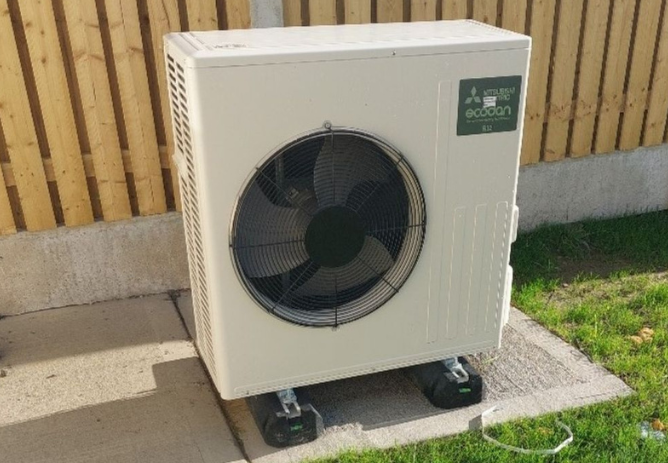22 May 2024
Homeowners Guide to Heat Pumps
How You Can Benefit from Investing in a Heat Pump System
Heat pumps are gaining popularity in Ireland for a reason: they offer a cost-effective and environmentally friendly way to heat your home.
We have summarised the SEAI Guide to Heat pumps below , but you can find the full document HERE.
Investing in a heat pump system offers multiple benefits, transforming your home into a more energy-efficient, comfortable, and environmentally friendly space.
Here's how you can reap the rewards:
- Enhance Energy Efficiency and Reduce Consumption
Heat pump systems are designed to utilise renewable energy sources, significantly reducing your home's overall energy consumption. By moving away from traditional fossil fuel-based systems, you can create a more sustainable living environment.
- Maintain a Constant Temperature
One of the primary advantages of a heat pump system is its ability to maintain a consistent temperature throughout your home. This not only improves overall comfort but also has positive impacts on your health by ensuring a stable indoor climate.
- Switch to Clean Energy
Transitioning to a heat pump system helps you move away from fossil fuels, contributing to a cleaner, greener planet. By using renewable energy, you can significantly lower your carbon footprint and help combat climate change.
- Lower Energy Bills
Heat pump systems are highly efficient, often producing three to four units of heat for every unit of electricity consumed. This efficiency translates into lower energy bills, saving you money in the long run.
SEAI Grant Support for Heat Pump Systems
The Sustainable Energy Authority of Ireland (SEAI) offers grant support for homeowners looking to install heat pump systems through the Home Energy Upgrade grant programs. These grants can help offset the initial costs, making it more affordable to switch to this energy-efficient technology.
The SEAI offers grants (up to €6,500) to encourage heat pump installations.
Inefficient Heating Systems
Traditional heating systems are often inefficient, consuming large amounts of fuel to maintain comfortable temperatures and hot water in the home. This not only leads to higher energy bills but also increases greenhouse gas emissions.
Transforming Your Home with a Heat Pump System
Replacing your conventional heating system with a heat pump, particularly in a well-insulated home, can significantly enhance comfort levels while reducing energy consumption. Moreover, heat pump systems can eliminate the need for oil and gas, further reducing your energy costs.
Preparing Your Home for a Heat Pump System
To ensure your heat pump system performs optimally, your home needs to be well-insulated with high-quality double or triple-glazed windows. Proper insulation will keep your electricity bills low by maximising the efficiency of the heat pump.
Types of Heat Pump Systems
Heat pump systems vary based on their heat sources and distribution methods:
- Air Source Heat Pumps
These are the most common and include:
- Air to Water Heat Pumps: Distribute heat through radiators and underfloor heating, also providing hot water.
- Exhaust-Air to Water Heat Pumps: Similar to air to water systems but also recover heat from air drawn from the dwelling.
- Air to Air Heat Pumps: Distribute heat through air units but do not provide hot water.
- Ground Source and Water Source Heat Pumps
These systems draw heat from the ground or water bodies and are known for their consistent performance, even in colder weather. They involve higher installation costs due to the need for collector pipework but offer reliable heating solutions.
Choosing the Right Heat Pump System
The selection of a heat pump system depends on your specific needs, space availability, and budget. SEAI Registered Heat Pump Contractors and Technical Advisors can guide you through the decision-making process, ensuring you choose the best system for your home.
Getting Started
All homeowners, including private landlords, whose homes were built and occupied before 2021 can apply. This is defined as the date your electricity meter was installed. This is different to other grant measures where the home must be built before 2011. For homes built before 2007, a Technical Assessment by an SEAI registered Technical Advisor is mandatory. This assessment will help determine the suitability of your home for a heat pump system and identify any necessary insulation upgrades.
Homes built from 2007 onwards a Self-Declaration form OR a completed Technical Assessment must be completed and uploaded at application stage of a Heat Pump System.
Cost:
- Averages €10,000-€20,000+ depending on size, type, and installation needs.
- Long-term energy savings can offset initial investment.
Synergy Credit Union and Green Loans:
We offer Green Loans to help finance energy-efficient home improvements like heat pump installations. Explore our website HERE or contact us on loans@synergycu.ie to learn more!
Questions to Ask Your Supplier and Contractor
Before proceeding with the installation, it's important to ask your supplier and contractor key questions about the equipment, sizing, design, installation, and maintenance of the heat pump system. This ensures you are fully informed and can make the best decision for your home.
Next Steps
Get More Information: Contact SEAI through their website, phone, or email for more details on Grant Programs.
- Technical Assessment: For homes built prior to 2007, engage a registered Technical Advisor for an assessment.
- Grant Application: Once approved, contact a registered contractor for installation.
By following these steps and ensuring your home meets the necessary requirements, you can successfully install a heat pump system, benefiting from lower energy bills, improved comfort, and a reduced environmental impact.
For more information, visit SEAI's Home Energy Grants.








